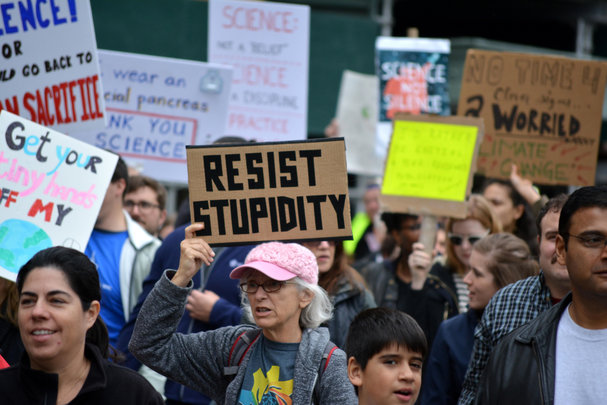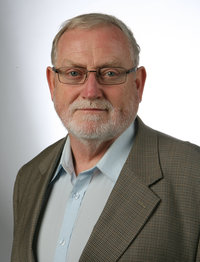
Participants at the March for Science in New York on 21 April 2017. Credit: Christopher Penler / Alamy Stock Photo
Post-truth tribalism is just the status quo
In a noisy arena, scientists must become more effective communicators.
18 January 2018
COMMENT

Christopher Penler / Alamy Stock Photo
Participants at the March for Science in New York on 21 April 2017.
I can understand how frustrating scientists find the assertions of uninformed people who simply reject the evidence of global warming, and are impervious to counter argument. Indeed, psychologists tell us, the more dire the warnings about how little time we have left to prevent hugely damaging climate change, the more the deniers’ scepticism is entrenched.
But I don’t find this evidence-denying, irrational behaviour all that surprising. I’ve lived with it every week of the 40 years I’ve been a commentator on economics. It strikes me that scientists know a lot about how the physical world works, but not a lot about how humans work.
Nor do they seem to know much about how the political game is played. People are given a vote regardless of how uneducated or unthinking they are, how willing they are to give free rein to instant, emotional reactions to developments, and their refusal to use their grey matter for anything other than enhancing their encyclopaedic knowledge of cricket scores and reality television?
Humans are also prone to tribal allegiance. Politicians have, for their own reasons, turned climate change into a tribal issue, where your tribe believes in it, but my tribe doesn’t? I can close my mind to all your arguments, can simply refuse to accept that your professed expertise means you know the truth but I don’t, for no reason other than that me and my tribe don’t believe that sh*t?

Ross Gittins
I’m not convinced we live in the post-truth era. As we have heard, the Oxford Dictionary defines “post-truth” as “circumstances in which objective facts are less influential in shaping public opinion than appeals to emotion and personal belief”. And this is something new? We used to live in a world where rational analysis reigned supreme, where no-one ever used facts selectively, no-one quoted a fact that needed checking, and all the policy decisions politicians made were based strictly on evidence? Where anything said by someone wearing a lab coat was accepted without question, but then along came the Internet and social media, and suddenly all respect for the truth, and facts and evidence and experts went out the window? Really?
I think we’ve always lived in a world where a lot of people choose not to use their brains for the purposes scientists think they should, where they much prefer to rely on their emotions, where anti-intellectualism is common. In fact, our population is better educated than it has ever been, and universities try to teach us to think critically about the pronouncements authority figures make, even those who tell you they’re experts. Don’t just nod when your doctor tells you something, put them through their paces.
To me, truth denying isn’t something new, it’s a description of the human condition.
What’s changed is that the Internet and social media have given the anti-intellectuals and tribalists and racists a microphone through which to broadcast their views. One effect of this is to make our tribe far more aware of the terrible things other tribes have always thought and said about us while out of our hearing. This means there’s now a lot more scope for people to be shocked and hurt by the new knowledge of the terrible things other people think and say about them. The Internet and social media have also made it far easier for disparate members of particular tribes (including the science tribe) to find each other and engage in mass confirmation bias. To rev each other up. Social media has facilitated the development of many and varied echo chambers. What’s less obvious to me is how much real difference this upsurge in preaching to the choir makes.
It probably contributes to the other forces making our politics and our community more polarised. Many speakers today have implied that there’s been a big increase in the community’s anti-intellectual attitudes and behaviour. This might or might not be true. Ironically, no one has produced any hard statistical evidence that it is. One alternative explanation for the trends we attribute to the digital revolution, but which hardly rate a mention today, is the longstanding decline in standards of political behaviour by the mainstream parties, which is prompting increasing numbers of voters to flirt with various strains of populism.
The digital age has made us more conscious of the anti-intellectualism and intolerance that has always been with us. It may also have added to the level of that dysfunctional thinking and behaviour. In any event, it has made us more conscious of the need to find new and more psychologically effective ways of getting through to those we believe need the benefit of our enlightenment.
This is an edited version of a speech given to the Royal Society of New South Wales and Four Academies Forum 2017, titled “The future of rationality in a post-truth world”. Abstracts of the other speaker’s talks can be found here.
Ross Gittins AM has been economics editor of The Sydney Morning Herald since 1978.
